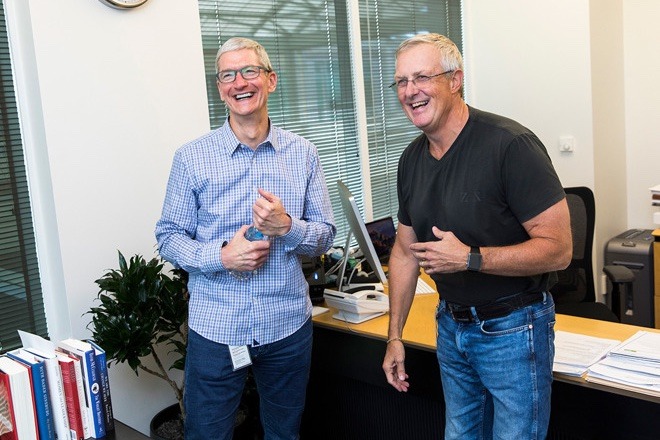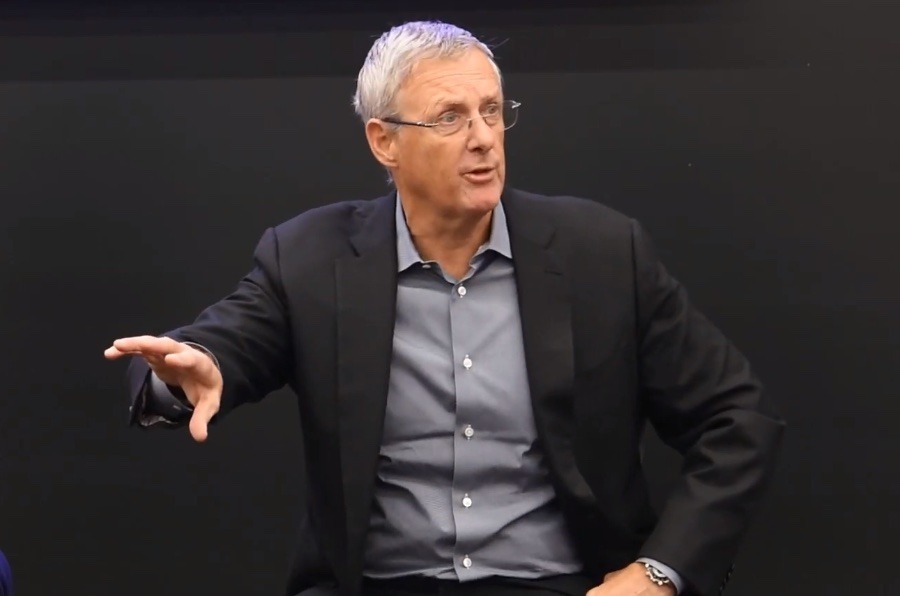In a wide-ranging interview, former Apple general counsel Bruce Sewell has told law students how the iBooks antitrust case went wrong, and also what it was like moving to Cupertino after years with the much more formal Intel corporation.
Bruce Sewell, who retired as legal general counsel at Apple in 2017, says now that he got the company's "so important" and "very ugly" iBooks case wrong. Speaking to law students, he talked about the risks that legal teams take and how Apple's Tim Cook reacted to the loss.
"Apple got involved in a very ugly suit with the US government in the Southern District of New York that had to do with our release of the iBooks Store," Sewell told an audience of lawyers for the YouTube series "Before You Take the LSAT." "I tried to chart a course that I thought was incredibly good for Apple, and would bear legal scrutiny."
Sewell was responding to a question about risk in the law and how you avoid it, but he answered that there are reasons to look for risk. "Steer the ship as close to that line as you can," he continued, "because that's where the competitive advantage lies. It's hard to say exactly where that line is... but you want to get to the point where you can use risk as a competitive advantage."
Speaking about how in-house legal teams work as opposed to outside counsel, he said that you need to be able to react and willing to change. "That's the point at which law actually becomes a commercial asset to the company," he explained. "If you can figure out how to get closer to a particular risk, but be prepared to manage it if it does go nuclear, your company is able to sail closer to the wind than its competitors are and that's a real advantage. But you have to have permission of the company to do that because every so often, you're going to get it wrong."
Regarding the iBooks case, he said that he hadn't got all the information he needed.
"There were some things going on amongst a group of publishers that I didn't know about," he continued. "If I had known about them, I would've taken a different tack. That was an example of sailing close to the wind because it was so important to Apple. But, in the end, I got it wrong. Apple ended up being sued by the government and having to pay a large fine."
Sewell also revealed what Tim Cook's response to losing the case had been.
"Tim's reaction was, [what we had done] was the right choice," he said. "'You made the best choice you could with the information you had. You didn't know about these other things. Don't let that scare you. I don't want you to stop pushing the envelope because that's why legal is an important function in the company.'"
Describing the general way that Apple's legal team functions, Sewell revealed that by the end of his tenure with the company, it had an annual legal budget of a billion dollars. Most of that was spent on litigation cases, and he gave as an example how the smartphone patent trial against Samsung at one point had 350 lawyers billing time. They had between seven and eight million documents to review, and spent in total some 208,000 hours on the case.
Sewell moved to Apple from several years as general counsel at Intel and was asked about how he found that change. "Going from Intel to Apple, in some cases, was like going from university to kindergarten," he said. "Because Apple's just this wild place. The atmosphere at Intel was very formal, the atmosphere at Apple is very creative, very laissez-fair."
"And so there's this sense of order leading to good results at Intel," he continued, "and kind of chaos leading to incredible results at Apple."
He stayed at Apple for eight years and said that when he decided to retire, he sent Tim Cook a note about starting to look for a replacement. "He didn't respond for, like, five days!" said Sewell. "I was just, oh my god, he's going to throw me out... [Then] he sent me the most beautiful note. He said 'sorry it took me so long to respond, but I kept thinking it was a nightmare and I was gonna wake up from it.'"
Sewell left Apple at the end of 2017 and was replaced by Katherine Adams.
 William Gallagher
William Gallagher








-m.jpg)






 Malcolm Owen
Malcolm Owen
 Mike Wuerthele
Mike Wuerthele
 Christine McKee
Christine McKee
 Charles Martin
Charles Martin

 Marko Zivkovic
Marko Zivkovic



-m.jpg)






54 Comments
There are a large number of CEOs who would have held Sewell personally responsible for that loss, and used him as a scapegoat. I might not agree with Cook on every single issue but, at least in this case, the man has integrity.
As Apple fanboy believing in the ethical Apple, this shakes me a bit, I must admit.. They are not into illegal stuff, but into 'barely legal' stuff.. I don't like it..
Interesting. I remember at the time that the consensus here was that the lawsuit was only brought about because the entire US legal system hated Apple and envied it for it's success.